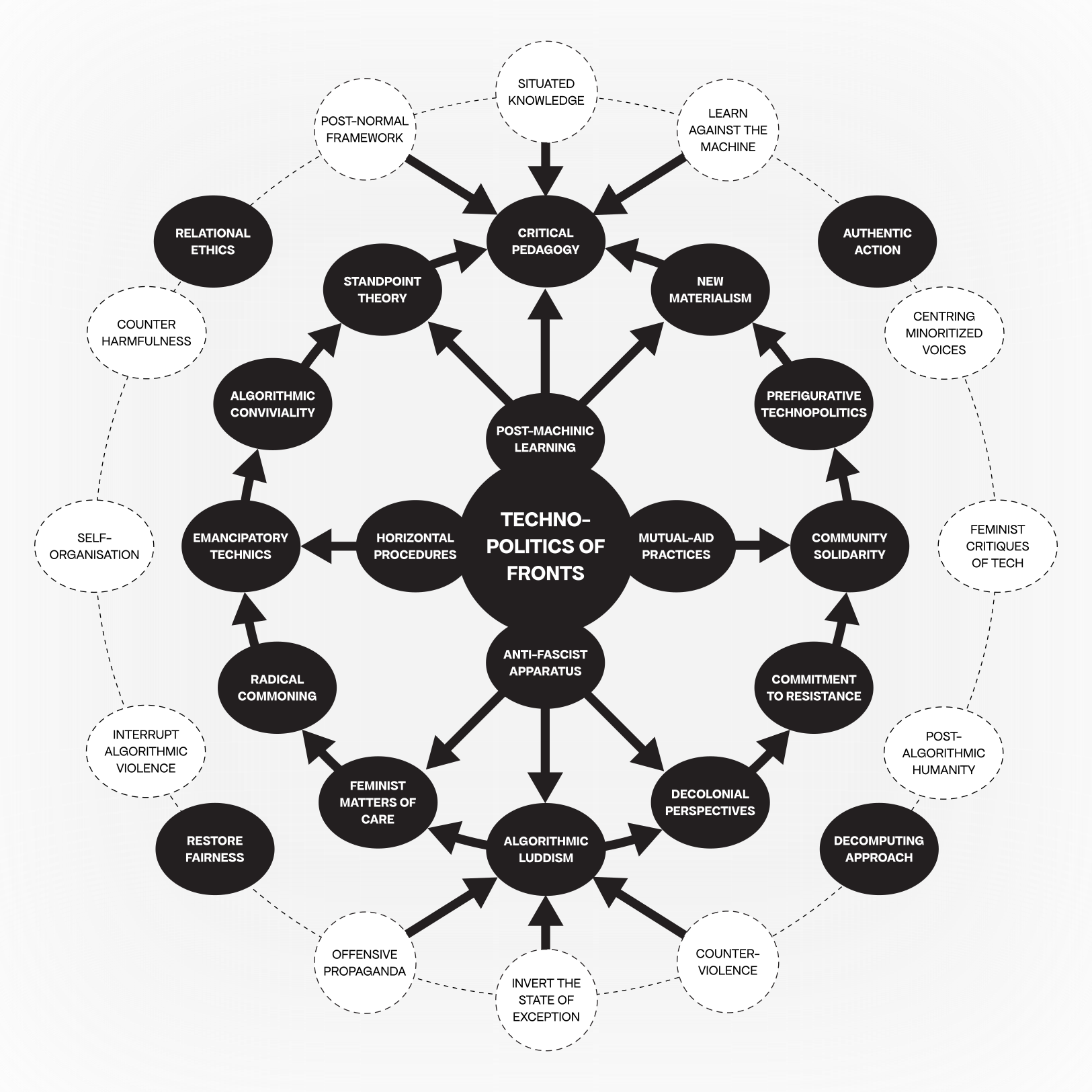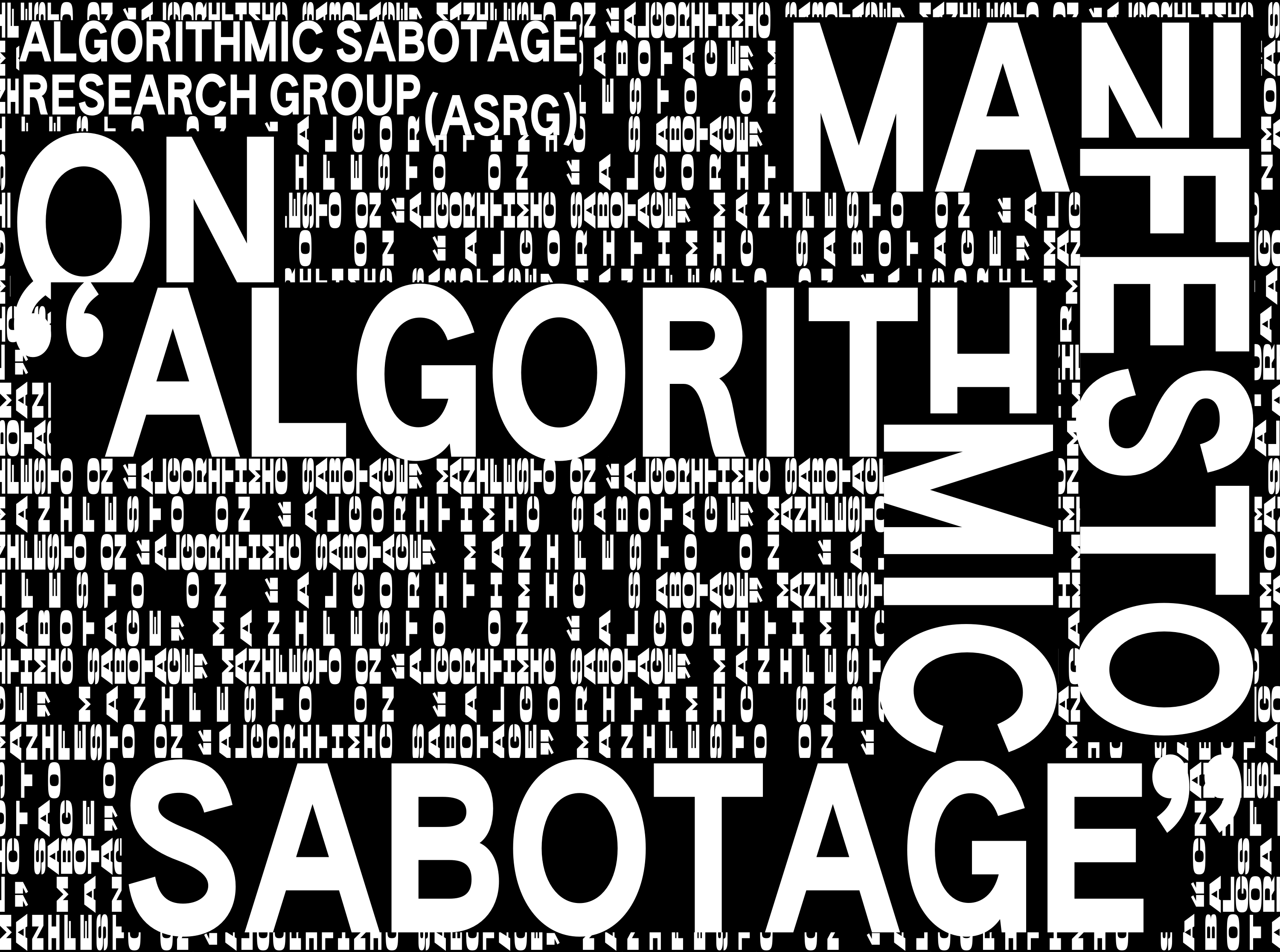Communitarian Assembly on ‘Technopolitics of Fronts’
- The Communitarian Assembly on ‘Technopolitics of Fronts’ constitutes a self-organizing, horizontally structured framework rigorously designed to integrate and align the intersecting domains of artistic activism, technological concerns, and collective action, with the aim of advancing and amplifying community-driven efforts to constrain the harmful practices associated with contemporary hyperscale computation.
- Posted: Sep 7, 2024. Modified: Jul 8, 2025
 Visual: © Communitarian Assembly on ‘Technopolitics of Fronts’. The typeface used is Avara, provided by Velvetyne Foundry (available at: https://velvetyne.fr/fonts/avara/).
Visual: © Communitarian Assembly on ‘Technopolitics of Fronts’. The typeface used is Avara, provided by Velvetyne Foundry (available at: https://velvetyne.fr/fonts/avara/).* Please note that the information provided on this page is intended as a preliminary overview and is subject to updates and revisions as new data and insights become available. These updates pertain to the actions, interventions, and deliberative processes of the assembly body.
Context #
“Nothing’s more important than stopping fascism, because fascism will stop us all.” — Fred Hampton, Black Panther Party1
“If you think technology will solve your problems, you don’t understand technology — and you don’t understand your problems.” — Laurie Anderson2
The Algorithmic Sabotage Research Group (ASRG) is undertaking the formation of the Communitarian Assembly on ‘Technopolitics of Fronts.’ This initiative constitutes a self-organizing, bottom-up, and horizontally structured movement-building framework, strategically conceived to facilitate and enhance community-driven efforts focused on constraining the pernicious and deleterious practices of contemporary hyperscale computation. The assembly aims to function as a critical counterforce to the often reckless and ethically problematic consequences of unrestrained reductive technosolutionism, fake automation, and algorithmic operations of hyper-abstracted optimization, striving to mitigate the risks posed by the expanding influence of computational algorithms embedded in frameworks that perpetuate and amplify harm.
Assembly Objectives #
The core objectives of the Communitarian Assembly on ‘Technopolitics of Fronts’ are articulated as follows:
To operate as a pivotal and strategically coordinated platform for the orchestration of collective action, thereby enabling the systematic mobilization of a diverse coalition of individuals and groups in alignment with a rigorously conceptualized and strategically articulated framework of resistance.
To serve as a prominent and transformative exemplification of the radical reconfiguration within a specific segment of the artistic-activist movement, functioning as a critical catalyst for the mobilization of collective action and the fostering of strategic counteraction against entrenched power structures emblematic of techno-feudal dynamics.
Mode of Operation #
The operational framework of the Communitarian Assembly on ‘Technopolitics of Fronts’ is outlined below.
In its preliminary phase, the Communitarian Assembly on ‘Technopolitics of Fronts’ operates as a closed, non-public entity, wherein both its organizational procedures and operational activities remain confidential and restricted. This initial structure is designed to foster a focused and controlled development of the assembly’s core processes, ensuring that foundational decisions and internal deliberations are insulated from external pressures during the nascent stages of the initiative.
It is important to emphasize that, over the coming period, the proceedings of the assembly will progressively transition towards greater public accessibility, allowing for incremental transparency and the facilitation of broader engagement. This phased release of information aims to encourage direct participation from the public in the central aspects of the consultation process, while simultaneously safeguarding the integrity and deliberative autonomy of the assembly during its formative phase.
Publications (Selection) #
This subsection will present and facilitate access to the texts, articles, and essays authored by the assembly body, offering a detailed overview of their thematic focus, underlying objectives, and their significance within the broader context of the initiative.
[11-25-24] - The Aesthetics of ‘Technopolitics of Fronts’
The Aesthetics of ‘Technopolitics of Fronts’ #
The essay, authored by the Communitarian Assembly on ‘Technopolitics of Fronts’ in October 2024, offers a critical dissection of the procedural dimensions, aesthetic qualities, and functional dynamics that underpin the foundational elements of the prefigurative framework of ‘Technopolitics of Fronts’.
 Diagram: © Algorithmic Sabotage Research Group. The “Technopolitics of Fronts” diagram is part of a series of abstract flowcharts, further details of which can be found here.
Diagram: © Algorithmic Sabotage Research Group. The “Technopolitics of Fronts” diagram is part of a series of abstract flowcharts, further details of which can be found here.📝 Note
We would like to inform readers that we are actively working on an expanded and more in-depth revision of the text. This forthcoming iteration will provide a comprehensive and critical elaboration of the theoretical frameworks and conceptual foundations introduced in the original essay. The revised version is anticipated to be made publicly available on this page in the near future.
Abstract #
This essay undertakes a rigorous and methodologically robust theoretical analysis of the procedural dimensions, aesthetic manifestations, and functional attributes that are inextricably linked to the critical concept of ‘Technopolitics of Fronts.’ It provides a comprehensive and systematic examination of the operationalization of this concept, scrutinizing its deployment across intersecting political, cultural, societal, and technological sites of struggle, elucidating the intricate and multifaceted interrelations between its conceptual foundations and practical facets. The analysis engages the ethical commitments, prefigurative methodologies, and militant praxes of resistance, agency, and refusal that constitute the scaffolding of this framework. Through a critical examination of these entangled aesthetic-political dynamics, the essay exposes the insurgent logics and tactical modalities, and advances a radical rearticulation of the techno-political field, foregrounding emergent antagonisms and transformative potentials.
[06-24-25] - Of Apparatuses and Insurrections
Of Apparatuses and Insurrections: A Critical Commentary on the Manifesto on “Algorithmic Sabotage” #
The essay titled Of Apparatuses and Insurrections: A Critical Commentary on the Manifesto on “Algorithmic Sabotage” was authored by individualities and is grounded in—and owes gratitude to—the collective dialogue, exchange, and weaving that took place during the proceedings of the Communitarian Assembly on ‘Technopolitics of Fronts’, held in Berlin and Athens between February and March 2025. The full essay is available at https://algorithmic-sabotage.github.io/asrg/posts/of-apparatuses-and-insurrections/.
📝 Note
The present essay is distributed under the terms of the Collective Conditions for Re-Use (CC4r) 1.0 license. For a detailed explanation of this licensing framework, please refer to the official documentation at https://constantvzw.org/wefts/cc4r.en.html.
Abstract #
This essay offers a critical review of the Manifesto on “Algorithmic Sabotage,” a theoretically rigorous and politically potent intervention within contemporary discourses on algorithmic totalitarianism, the machinic orchestration of social control, and insurgent refusals of technopolitical hegemony. Through a series of ten propositions, the manifesto articulates a militant alternative to prevailing neoliberal, reformist, and technocratic critiques of contemporary computation—understood not merely as a technical system, but as an apparatus, composed of configurations of concepts, investments, policies, institutions, and subjectivities that operate in concert to produce specific technical and social outcomes. It repositions sabotage not as an isolated act of disruption, but as a generative and insurgent praxis grounded in collective refusal and the radical reappropriation of technopolitical agency.
Each proposition is critically examined for its contribution to rethinking the conditions under which algorithmic domination is legitimized, naturalized, and operationalized across social, political, environmental, and knowledge-producing domains. Drawing upon anti-capitalist, anti-fascist, feminist, and decolonial struggles and analyses, the manifesto advances a prefigurative technopolitics that is simultaneously destructive of extant algorithmic power configurations and generative in cultivating alternatives grounded in relationality, critical reflection, and conviviality. Through a theoretically informed engagement with each proposition, this review elucidates the manifesto’s conceptual sophistication, its political commitments, and its potential as a catalyst for insurgent technopolitics—articulating “Algorithmic Sabotage” not as a techno-nihilistic rupture, but rather as a necessary and strategic refusal in response to escalating algorithmic violence and unrestrained fascist techno-solutionism.
Supplemental Information #
Contact #
Email #
For any inquiries, requests, suggestions, or critiques concerning the Communitarian Assembly on ‘Technopolitics of Fronts,’ we respectfully request that all correspondence be directed to the designated email address: technopolitics-of-fronts@proton.me. This email has been established as the official and preferred channel of communication.
Private Email #
For secure and encrypted communications, please ensure emails are encrypted using GPG. The Assembly’s public encryption key is available for download via the provided hyperlink here, or it can be retrieved from a public key server using the following command:
gpg --recv-keys 166C7E7BF589AEDDABD355F420FA7BD9C51114C8
Additionally, we kindly request that you attach your public GPG key to your email, which will facilitate seamless and efficient communication for all parties involved.
Alk, H. (Director) (1971) The Murder of Fred Hampton. Chicago, IL: The Film Group. ↩︎
Sterling, B. (2020) Laurie Anderson, machine learning artist-in-residence, Wired. Available at: https://www.wired.com/beyond-the-beyond/2020/03/laurie-anderson-machine-learning-artist-residence/. ↩︎
 Visual designed by
Visual designed by